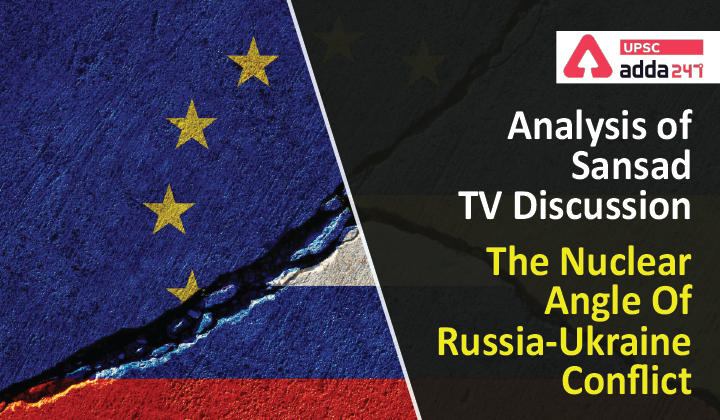Table of Contents
Analysis of Sansad TV Discussion: The Nuclear Angle Of Russia-Ukraine Conflict
Relevance
”GS 2: Bilateral Groupings & Agreements, Effect of Policies & Politics of Countries on India’s Interests”
Introduction
- Western nations have united to impose potentially crippling economic and financial sanctions against Moscow.
- The very existence of the Putin system may have been put in doubt.
- Meanwhile, Putin ordered Russia’s nuclear forces to be put on high alert Sunday, citing Western sanctions and “aggressive statements” by NATO powers.
Options for Putin
- Putin’s in a tight spot as he doesn’t have many options left, once the West freezes the assets of the Russian Central bank and Russia’s financial system actually implodes. That will make the system unworkable.
- One option for him is to cut gas supplies to Europe, hoping that will make the Europeans climb down.
- Another option is to explode a nuclear weapon somewhere over the North Sea between Britain and Denmark and see what happens.
Threat or Deterrent
- Russia has put its nuclear forces on alert, calling it a special regime of combat duty; these include the Intercontinental Ballistic Missiles (ICBMs) that have a range of 5,000 plus and are designed to use nuclear weapons.
- While the Russian announcement might just be a deterrent as such weapons always maintain a high level of readiness, the mention of the word ‘nuclear’ cannot be ignored.
What’s happening with Russia’s nuclear deterrent?
- Russian military’s nuclear deterrent forces have been put on high alert in line with Putin’s order.
- Defense Minister Sergei Shoigu reported to Putin that command posts of all components of Russia’s nuclear forces have been beefed up with additional personnel.
- The Defense Ministry said that the high alert status applies to all components of Russian nuclear forces — the Strategic Missile Forces that oversee land-based intercontinental ballistic missiles, the Northern and Pacific Fleets that have submarine-launched intercontinental ballistic missiles; and long-range aviation, which has a fleet of nuclear-capable strategic bombers.
How many nuclear weapons does Russia have?
- According to the Federation of American Scientists, Russia has a total nuclear warhead inventory of 5,977 – this is the biggest in the world.
- In comparison, the US has 5,428 while France has 290 and the UK has 225.
- The Bulletin of the Atomic Scientists says the Russian arsenal includes 4,447 warheads of which 1,588 are deployed on ballistic missiles and at heavy bomber bases.
What threat do the weapons pose to Ukraine and the wider world?
- Intercontinental ballistic missiles (ICBMs) in Russia’s possession have the capability to reach and destroy major global cities such as London or Washington.
- ICBMs can reach a top speed around 10 minutes after launch which could see one fired from Russia reach the UK in just 20 minutes.
- This means the sort of equipment [like] an intercontinental ballistic missile – that means it reaches from Russia to the US and obviously into Europe.
What would be the expected procedure for Russia to launch a nuclear weapon?
- The country’s president, defence minister or chief of the general staff must give permission through what is called the Cheget nuclear suitcase.
- Russian nuclear doctrine allows for use of what is known as a tactical nuclear weapon – a limited nuclear explosion – to be deployed in a conventional conflict to make the enemy back down.
- Strategic nuclear weapons can hit targets much further afield, such as the US.
- Tactical nuclear weapons is the term used for those deployed on a battlefield, such as Ukraine.
Conclusion
The war in Ukraine is Vladimir Putin’s war. If the Kremlin leader achieves his military aims, Ukraine’s future as a sovereign nation will be in doubt. If he is perceived to be failing and suffers heavy casualties, the fear is that could prompt the Kremlin to adopt more desperate measures.



 TSPSC Group 1 Question Paper 2024, Downl...
TSPSC Group 1 Question Paper 2024, Downl...
 TSPSC Group 1 Answer key 2024 Out, Downl...
TSPSC Group 1 Answer key 2024 Out, Downl...
 UPSC Prelims 2024 Question Paper, Downlo...
UPSC Prelims 2024 Question Paper, Downlo...




